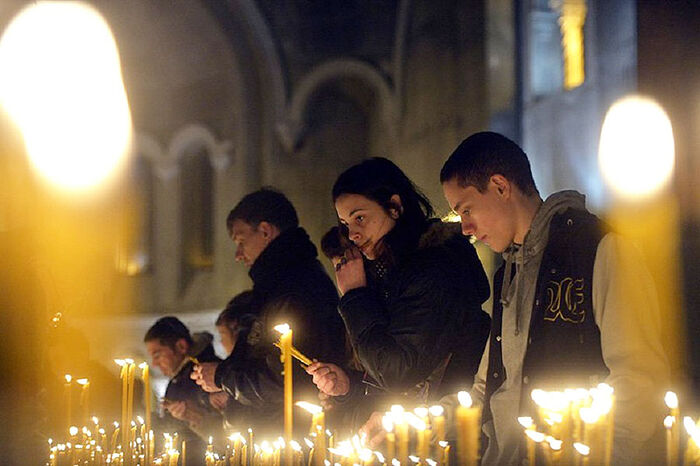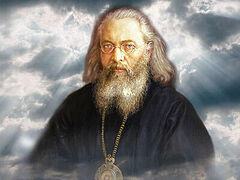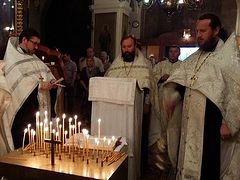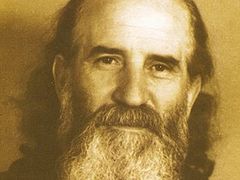Not a single question has so troubled the human mind throughout the entire existence of man as the question of the immortality of the soul, life beyond the grave. Before we begin to unpack this subject, we must say that even for the present time it is the most urgent question, the difficulty of which the greatest philosophers and thinkers recognize. But we shall be guided not only by our own reason, but mainly by Holy Scripture.
I know that having chosen this question as the subject of today’s talk with you, I will run up against prejudices and various teachings of the present time and will have to swin against the stream of modern philosophers. From beginning of Christianity’s existance, not a single era has been less filled with the awareness of eternity as the current one. The thoughts of modern generations surrounding us are focused on the present hour, on the realm of the visible world. The question that will serve as the subject of today’s talk does not at first glance seem like anything real or relative. This view troubles me a little, my efforts feel pointless, my theological and philosophical knowledge seem inadequate, and I’m as if ready to step down from this lofty Church cathedra in mute silence, but nonetheless without loss of energy. The thoughts of modern generations, as I have already said, are directed at the present hour, to the realm of the visible world. But Christianity is not a religion of epochs or hours; it is unchanging in its dogmatic and moral truths. The Christian religion concerns human souls, and not the tastes of the times, different persons or schools, trends and tendencies. Christianity was founded upon a strong foundation that is unshakeable, and it does not seek support in the reigning thoughts of the present day. It seeks and finds support in the sufferings and constant strivings of mankind.
The future life has been rejected by many and throughout all times, and it is being rejected in our own time. Some approach the coffin of a dead man only in order to take his body as something no longer needed, even hazardous, and bury it in the graveyard. Not a single prayer leaves their lips, not a single divine word illumines their sadness; and what are prayers and divine words to them when they don’t believe in God and life beyond the grave. Others—believers—see off the dead in hope of meeting again in life beyond the grave. Some say to themselves: Let us eat and drink, for tomorrow we die (1 Cor. 15:32), and if they sometimes did accept that there is a future life, then they did so out of practical materialism. Others work out their salvation in fear and trembling. Some insist that with death, everything ends for a person. According to their opinion there is no soul in man, and what we call the soul, in their words, dies along with the body. This is said only by those who, along with the soul, reject the existence of God also. The main characteristic of such people is carelessness—they live without a thought for anything, they are not interested in anything from the realm of the higher and spiritual; they live for the most part lawlessly, striving for only one thing: how to live better, more comfortably, and have more fun; to live as long as life satisfies them, even though it’s filled with all manner of lies, unrighteousness, wickedness and deceit. That is why the existence of God and the soul is for them but an unpleasantry that hinders their broad life from flowing as it flows—and that is why they reject God and the soul. They recognize that lawlessness must be answered for, and so they placate themselves and say that there is no God and no such thing as as an immortal soul. Their view of God and the soul flatters their sinful and corrupt nature, it gives them the daring to eat, drink, and be merry, for according to their opinion tomorrow they will die anyway, and there is no life over there beyond the grave, no soul, and no account to anyone for their deeds.
But let them talk and insist on this. We know that there is a soul and that it is immortal. This is confirmed to us by Holy Scripture. In the book of Ecclesiastes in the Old Testament it says, Man goeth to his long home (that is, after bodily death)… Then shall the dust (that is, the body) return to the earth as it was: and the spirit shall return unto God who gave it (Eccl. 12:5, 7). The same is written in the book of the Wisdom of Solomon: But the righteous live for ever, and their reward is with the Lord; the Most High takes care of them (Wis. 5:15).
All the Old Testament righteous ones also believed in the immortality of the human soul (and it follows that they also believed in life after death). But the immortality of the human soul is especially clearly felt in the New Testament There it is written plainly: And fear ye not them that kill the body, and are not able to kill the soul: but rather fear him that can destroy both soul and body in hell (Matt. 10:28); God is not a God of the dead but of the living (Matt. 22:32). Those Christians who died and attained the resurrection of the death, Neither can they die any more: for they are equal to the angels, and are the children of God, being the children of the resurrection (Lk. 20:35–36). This is why our Lord Jesus Christ many times repeated and said to His disciples and followers, Lay not up for yourselves treasures upon earth, where moth and rust doth corrupt, and where thieves break through and steal: But lay up for yourselves treasures in heaven, where neither moth nor rust doth corrupt, and where thieves do not break through nor steal (Matt. 6:19–20). Or read the twenty-fifth chapter of the Gospel of Matthew about the ten virgins—about the five wise and the five foolish virgins, how He warns His followers to store up oil along with their burning lamps, so that the lamps would not go out and the Bridegroom would not come to them unawares. Here is revealed the moment of the Last Judgment. If there were no life beyond the grave, or what is the same, if the human soul were not immortal, then why would Christ the Savior have warned His followers about the coming Judgment?
Besides the words of Holy Scripture of the Old and New Testaments, we are also convinced of the immortality of the human soul by the meetings between the souls of the dead with living people. These meetings always happened throughout the times of the Old and New Testaments. We can be convinced of this by the lives of Moses, King Saul, Prophet Samuel, and others. But we won’t cite examples here from the Old Testament. We will take for example the relatively recent past. Two hundred years ago, Russia boasted its famous scholar, Mikhail Vasilievich Lomonosov. While sailing (from Holland) to Russia on a ship, he had the following dream. He could see before him the boundless Arctic Sea, on which he often travelled in his childhood, and on the sea he noticed a boat with his father the fisherman seated in it. A fierce storm broke out, and the waves of the sea were about to swallow his beloved father. Lomonosov wanted to rush toward his father to help him, but his hands went numb. The boat was dashed against the rocks near an island and was shattered to pieces. Lomonosov was presented with a terrifying scene. His father was struggling with the giant waves of the cruel sea. He was immersed in the water for a minute and then rose to the surface and shouted, “Mikhailo!” but soon again was immersed in the water and disappeared from sight. A few minutes later he was thrown onto the shore. Lomonosov immediate woke up. The dream that he just had shook him terribly, and he decided in his soul that his father really had drowned in the sea, and having been thrown to the shore by the waves, was lying there, unburied.
When he arrived in Petersburg, with great difficulty he found some men from his native region and asked about his father’s fate. They told him that at in early spring his father had set out to sea with his comrades, but four months had passed and there was no word of them. Disquieted in soul, Lomonosov wanted to go himself to the island he had seen in his dream and which he knew from childhood, but he was not released from Petersburg. Then he asked the local fishermen to go to that island, and if they should find his father, to bury him. And truly, the fishermen found the body of Lomonosov’s father in the place he had directed them to, and they buried him. Isn’t it clear from this that the soul of the father had appeared to his own son in a dream to tell him about his pre-death suffering and after-death pressures due to the fact that he remained unburied and without prayers? This is what the famous Mikhail Vasilievich Lomonosov himself believed.
The souls of the dead appear not only in dreams, but also plainly. The immortality of the human soul appears here more precisely and is revealed even more clearly. Here a person sees the dead with his own eyes as the living, and because he knew the reposed one well before his death, he cans say unmistakably that he sees precisely that friend or relative.
The aims of the souls of the dead’s appearance to the living can vary. Very often they appear in order to improve in one way or another their condition in the afterlife. For, as all we Orthodox Christians know, the prayers of the living, especially the prayers of the Church, bring great benefit to the souls of the dead—they relieve their onerous lot if they are suffering torments in the afterlife for their sinful earthly life. But sometimes the souls of the dead come by God’s will to earth for the benefit of one or another relative, wishing to provide him some spiritual benefit. Most often they appear to those relatives who have begun to live a bad life—godless or dissipated. In this case, one way or another they help their relative to correct himself, to step once again upon the path of truth. Or they may appear in order to do some good for their close relative that they didn’t manage to do before their death. Thus, the soul without a body appears for a brief time as if to continue the work he began in his life in the body.
Sometimes the souls of the dead appear to relatives simply out of the feeling of kinship, as if pining for them. Obviously, after its departure from the body the soul doesn’t lose for a certain time the connection it had with them while in the body, and at God’s will, they somehow show that connection. Moreover, the dead not rarely bring by their appearance some mundane profit, clear up one or another perplexity that they had not done during their earthly life, or show them where they should receive some profit for themselves.
After close family, the closest person is always a friend or benefactor. People have a sincere attachment and gratitude to friends and benefactors. A person’s soul, which never dies, is immortal, after its departure from the body also keeps these feelings and not rarely appears from the world beyond the grave to its friends and benefactors in order to witness its friendship or gratitude to them.
If time allowed I could tell you about many different cases of the souls of the dead appearing to living people. From these appearances, along with the testimony of God’s word, it is clear that a person’s soul does not die after its departure from the body, but lives and will live eternally—in other words, the human soul is immortal. And if the soul is immortal, then whoever has faith in its immortality should be prepared for this; he should arrange his life on earth so that the soul would be prepared for its future life. Earthly life can last only a few decades and is only the beginning of a person’s life—the main, real life will come afterwards and lasts not some decades, but a countless number of years, eternally. This is what every Christian must think about. Each of us must have faith that death is not the end, but only the beginning of life, and therefore we must prepare in advance, in a timely manner for it. It can come at any time. The curtain may close today or tomorrow, and each will go to the place of no return. There will be the reward for all that was done during this brief earthly life.
Brothers! Believe in life beyond the grave, believe in the immortality of the human soul, believe that after death you will live eternally. If you do not believe in this, then you do not believe that the Lord Christ resurrected, and then your faith is in vain. Beware of false teachings and false teachers, who preach and see in death total destruction of the human soul. This is particularly noticeable in our age. But let this age be troubled, trying in the name of reason to base its belief on eternal life; let it find its defense for its deeds in apologists more eloquent than Russo or thinkers more profound and penetrating than Plato. We Christians can await their results without fear. I will remind you only of the final discourse of the greatest of the ancient philosophers with his disciples in the prison in Athens. Socrates was dying, poison was coursing through the great sage’s veins, and his members were growing cold. His disciples, leaning toward him, asked him with worried gaze what is being presented to him after this world; and he, a perspicacious genius, a lofty and sincere soul, had tried to lift the curtain; he tried to show that the human soul is immortal. And with his failing voice he reminded them of all the proof of this great truth! But to what did his efforts lead? Did he reveal this desired truth? Alas! The great genius and philosopher could only say, “Perhaps…” He imagined the future as dark, unclear; and on the eve of his trial words broke from his lips that were filled with melancholy: “If destruction is my lot, I would just the same prefer life, for I have experienced that the best day of my life is not worth one night of tranquil sleep.” This is how the efforts of one of the greatest philosophers and geniuses ended.
But modern philosophy, just like ancient philosophy, has taken a false path. It thought to base belief in the immortality of the human soul through its own efforts. It is sufficient to recall the deaths of such as Roland, Valase, Leba, Condorcet,1 and others. There was no voice of eternity to be heard there.
Philosophy will never be able to base faith in eternal life. And the human soul cannot be satisfied with a single philosophical theory. Needed is a voice from heaven that would proclaim eternal life; and there was this Voice, and we came to believe in Him with our whole soul and whole heart. This Voice encouraged us and all sanely-thinking mankind. But is now made manifest by the appearing of our Saviour Jesus Christ, who hath abolished death, and hath brought life and immortality to light through the gospel (2 Tim. 1:10). Beginning with Jesus Christ, sanely-thinking mankind confesses its faith in life eternal. Beginning with Him, this faith has possessed the hearts of millions of people throughout all ages with such miraculous power, that they went to torments as to a feast—however, not in order to be rid of life like a Hindu who kills himself, and not in order to taste the delights of a sensual paradise, like the followers of Mohamed, but in order to enter into the life of truth, sanctity, and love. We, faithful to Christ God, shall together with the longsuffering Job say, For I know that my redeemer liveth, and that he shall stand at the latter day upon the earth: And though after my skin worms destroy this body, yet in my flesh shall I see God: Whom I shall see for myself, and mine eyes shall behold, and not another; though my reins be consumed within me (Job 19:25–27).
In reading through the New Testament of our Lord Jesus Christ I found the words, “eternal life” forty times in it. And I can confirm beyond any doubt that the Savior placed the goal of eternal life in His teaching. Seek ye first the kingdom of God, and his righteousness (Matt. 6:33), He said. But how could we seek the Kingdom of God if there were no life beyond the grave? The Kingdom of God and His righteousness begins here, within us; but it will be full and eternal after death, for our abode is in the heavens (Phillip. 3:20), but here, on earth we are strangers. This life is a life of waiting, we are temporary travelers seeking for the quiet eternal harbor of heaven. I do not understand the state of the soul of those people who complete their earthly path with all its difficulties without God and His help, without faith and hope. In the most difficult moments of life, in the worst sufferings, there was and is in my heart a triumphant hope, which strengthens me on this thorny path. I consider thus: I do not belong totally to the earth, my earthly life is temporary, but I can suffer, for I know that my sufferings have an aim, which eternity explains to me. I also know that whom God has mercy upon, him does he teach. With this conviction I can suffer. Suffer also, you my brothers, in the hope that your suffering will lead you to the goal. Sew after you and around you your living hope, disperse this hope in the nights of doubt, preach the future life, without which this earthly life would be most senseless, unnecessary, and aimless. Let us believe that now is Christ risen from the dead, and become the firstfruits of them that slept (1 Cor. 15:20). Amen.
Delivered in the Kineshma Metropolia, February 8, 1910.





